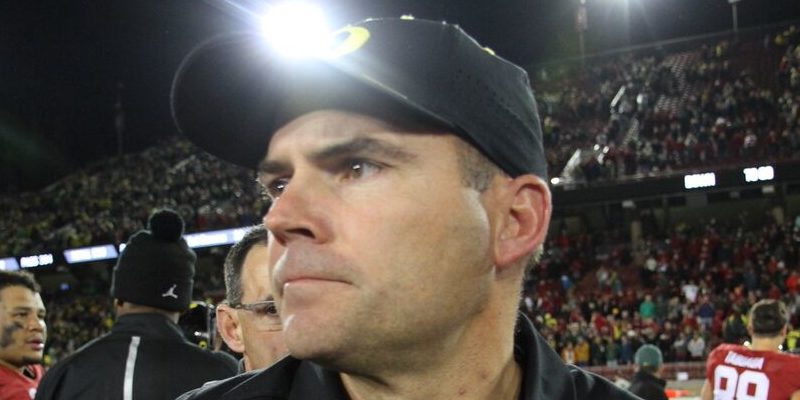Imagine the horror: your team has patiently built itself from its historically-mediocre origins to become one of the nation’s elite, with a succession of conference titles and high NFL draft picks, when one year suddenly everything falls apart. Your genius coach is gone and his successor is suddenly, after years of riding the coattails, struggling just to post a winning season. No wonder the natives are getting restless.

Coach Shaw smoothing the waters.
I’m speaking, of course, about the 2014 Stanford Cardinal.
It’s easy to forget that while Oregon was busy securing a Heisman Trophy and a second national championship game appearance two years ago, the Cardinal were suddenly questioning everything after a 7-6 regular season. Just one year after winning a second straight conference title in his fourth year at the helm in 2014 (just as Mark Helfrich is this year), head coach David Shaw found himself and his future being openly questioned by Stanford fans who had worshipped him just months earlier. It seemed pretty clear that Shaw was no Jim Harbaugh, and the magic was gone.
A year later, Stanford won the Rose Bowl, with star player Christian McCaffrey finishing second in the Heisman voting.
Don’t get me wrong, my fellow Duck fanatics: I’m worried too. This season has turned out to be Oregon’s worst in more than 20 years, and like you, I’ve wondered with increasing consternation what the future holds. The Ducks have never been a traditional powerhouse with the kind of backyard full of 5-star recruits that has allowed teams such as Alabama, Ohio State and USC to rack up national championships over several eras. It always seemed likely that the Ducks would someday at least decline a little bit, perhaps from Rose Bowls down to Alamo Bowls, as happened in the injury-plagued 2013 and 2015 seasons.
The fact that we’ve been this good for this long – college football’s winningest program from 2010-14 and only one losing season in the last 22 – is a testament to Oregon’s innovation and hutzpah. But suddenly this year it seems the program has potentially taken more than a step backwards. If the Beavers weren’t on the schedule at regular season’s end, I honestly would be wondering if Oregon would win another game this year.

Coach Helfrich greeting coach Meyer at the National Championship Game.
Yet whether it’s the Stanford example above or any number of examples from the Ducks’ own history, there is a very strong case to be made: that the greatest threat to the future of our beloved Oregon football program is ourselves, given fans’ tendency this year to panic the moment the going gets tough.
Keep in mind: this season is less than halfway done. While Oregon’s defensive struggles have been tremendous as the team transitions from a 3-4 to a 4-3, it’s still entirely possible that these players will begin to gel. And even if they don’t, there is a strong argument to be made that if Oregon gives Brady Hoke enough time to recruit his own players (he has proven to be an ace recruiter), this former Michigan head coach will right the defensive ship.
Meanwhile, Helfrich’s offense is mostly as potent as ever, and if it isn’t, we can chalk it up to a very young and inexperienced offensive line more than the coach’s lack of prowess with X-and-O strategy.

Brady Hoke has to make some changes on the defense.
Let’s say Oregon finishes with a losing season, which is pretty likely, or a .500 campaign, at 6-6. If that’s the case, maybe one could argue that a change is necessary with the defensive coaching staff if the unit still hasn’t improved by the last game. Maybe, despite his defensive success as a head coach, Hoke isn’t a natural-born defensive coordinator.
But let us be clear: firing Helfrich at the end of this season would be a huge mistake, no matter how many losses come over the next two months. Even if Oregon doesn’t win another game and finishes 2-10, such a termination would still be a mistake.
Our belief in Helfrich shouldn’t just come out of loyalty to a coach who led Oregon to a national championship game and a Heisman. It should come because of Helfrich’s brilliance and because Oregon’s history shows hastiness is a mistake while faith pays off.
Look at Chip Kelly’s three-plus years in the NFL. He may still prove himself successful with the 49ers, or another pro team after that. But many, including FishDuck.com stalwarts such as founder Charles Fisher and “Grizzled Old Coach” Mike Morris, see Helfrich innovating more with new plays for Oregon’s offense than Kelly has in Philadelphia or San Francisco. Could it actually be that behind the grand vision of a no-huddle blur offense and the ensuing cult of personality Oregon fans and the media have given Kelly, that Helfrich was his secret weapon?
Looking back at how the University of Oregon handled coaching decisions in the past, three of them - Jerry Frei, Rich Brooks and Mike Bellotti – provide arguments for keeping Helfrich.
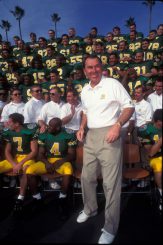
Coach Rich Brooks and the Oregon Ducks at the Rose Bowl.
Like the man in charge today, Frei followed a Ducks coaching legend, Len Casanova, and was the handpicked successor. After two losing seasons to begin his tenure (Cas had handed off a losing squad), Frei’s Ducks finished second in the Pac-8 conference in 1970. By that time, Frei had also recruited two of the greatest Oregon players of all time: Dan Fouts and Bobby Moore (later and still known as Ahmad Rashad). Yet after the team finished 5-6 in 1971, the university fired Frei, much to the consternation of its players and Casanova. Oregon would go on to experience seven straight losing seasons and 10 of the next 12.
The man who finally turned the Ducks’ fortunes around and led the team to its first Rose Bowl in 37 years, Brooks, could have been fired any number of times. In his first two seasons, Oregon won a combined total of five games in 1977 and ’78. Following two winning seasons in 1979 and 1980 (6-5 and 6-3-2), the latter season including wins over No. 2 USC and No. 8 UCLA (as well as a 34-10 upset of 18th-ranked Washington in Seattle), Brooks went on to experience five out of six losing seasons between 1981 and 1986.
Which is to say nothing of the NCAA probation Oregon faced on his watch. It wasn’t until 1989, Brooks’ 13th season in Eugene, that the Ducks finally made it to a bowl game. And even after that, fans were calling for Brooks to be fired as late as the 1994 season – after a 1-2 start – before the team rebounded all the way to a conference title and a Rose Bowl appearance.
No one can know for sure, but I think it’s very possible that if Oregon had fired Brooks at any of those junctures, the transformative 1994 season never would have happened, which means Nike never would have got involved, and likely the Ducks would never have risen to the stratospheric heights of the 21st century.
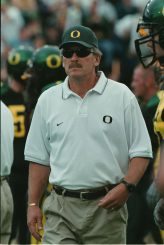
Coach Mike Bellotti
Same goes for Bellotti. Oregon had great success in his first year, 1995, with a Cotton Bowl appearance and a 9-2 record that actually improved on that of the Rose Bowl team the year before. But the next two years saw Bellotti’s Ducks barely able to maintain winning records. He could easily have been fired then, or in the mid-2000s when the Ducks finished 5-6 in 2004 and 7-6 in 2006, ending with an embarrassing Las Vegas Bowl blowout loss to BYU.
It’s true there are legitimate reasons to wonder about Helfrich. His greatest successes as head coach have come with players recruited during Kelly’s tenure – albeit in some key instances, like Marcus Mariota, that recruiting vision was courtesy of Helfrich. It’s also true that Oregon’s recruiting has suffered a bit under Helfrich, especially on the defensive side. After all, the biggest problem with Oregon’s defense this year may be not the transition to a 4-3 but the lack of really good players. It’s not outlandish to suggest Helfrich has squandered an inheritance his predecessors literally spent decades building.
Yet even if Oregon doesn’t win another game this year, the retention of Helfrich is such a no-brainer that in a certain respect I regret even dignifying it with this post. Yet defending Helfrich has to be done, because the clamor for his head has become surprisingly deafening for this early in the season.
Did Stanford fans call for Shaw’s head two years ago? I’m not sure, but I seriously doubt it. And you can say a lot about Stanford University, but those guys definitely aren’t stupid.
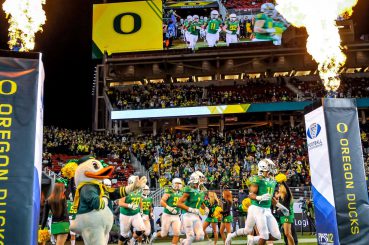
The Oregon Ducks and fans.
Maybe some of us calling ourselves Duck fans feel it’s best to identify the problem before it has time to fester and get worse. Maybe some of us don’t remember just what a long climb it was to greatness.
And maybe some of us forget the man in charge today is one of the key reasons we made it as far as we did. Most of all, maybe we forget that the best teams don’t panic when times become troubled.
We don’t just owe it to Mark Helfrich to keep the faith. We owe it to Jerry Frei and Dan Fouts and Ahmad Rashad. We owe it to Rich Brooks and Bill Musgrave and Kenny Wheaton. We owe it to Mike Bellotti and Joey Harrington and Dennis Dixon.
But most of all, we owe it to ourselves.
Brian Libby
Portland, Oregon
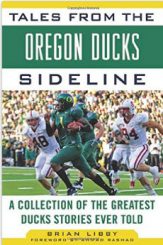 FishDuck Note: Brian is modest and does not tell us that he is a professional writer who contributed this for fun, but he did write a wonderful book about Oregon football that I highly recommend as a birthday/Christmas present. Being so busy, he cannot write for us often, but I am a big fan of his work and am very grateful. Charles Fischer
FishDuck Note: Brian is modest and does not tell us that he is a professional writer who contributed this for fun, but he did write a wonderful book about Oregon football that I highly recommend as a birthday/Christmas present. Being so busy, he cannot write for us often, but I am a big fan of his work and am very grateful. Charles Fischer
Disclaimer: Readers: Every writer on FishDuck.com is allowed to express their opinion in their articles. However, articles do not represent the views of the other writers, editors, coaching consultants, management, or the principals of FishDuck.com Charles Fischer
Top photo credit: John Sperry
Related Articles:
Oregon Football: Early 2026 Ranking Projections
FishDuck Foaming Over Upside of 2026 Diamond Ducks
Unbelievable...Same SEC Stuff, Different Day
Why Oregon Football Always Belongs in the National Conversation
The B1G Won the 2026 Coaching Carousel...Big-Time!
Continuity? Lanning's Hiring Success is Put to the Test
Brian Libby is a writer and photographer living in Portland. A life-long Ducks football fanatic who first visited Autzen Stadium at age eight, he is the author of two histories of UO football, “Tales From the Oregon Ducks Sideline” and “The University of Oregon Football Vault.” When not delving into all things Ducks, Brian works as a freelance journalist covering design, film and visual art for publications like The New York Times, Architect, and Dwell, among others.

